Examples of selected pilot projects
-
Waste sorting systems
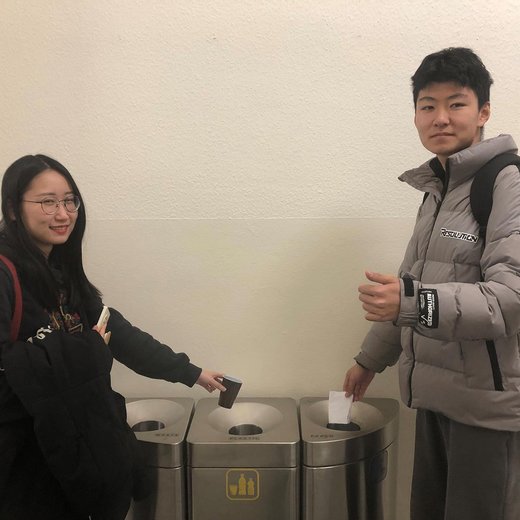
The establishment of a university-wide waste separation system is part of the action field "Sustainable university operations". In the Ratke building in Köthen, home to the Landesstudienkolleg (preparatory college) and the Department of Computer Science and Languages, such a system is being tested since October 2022. Representatives of the university’s departments/sections using the building support the technical administration and subordinate service providers in the selection and placement of the new separation bins and guide staff and students through the individual steps required to introduce the new system. After a parallel use of old and new collection systems, the second quarter of 2023 gives the new system a trial run. Lessons learned from the pilot will be incorporated into a university-wide policy of waste separation and prevention.
-
Agro-Photovoltaics
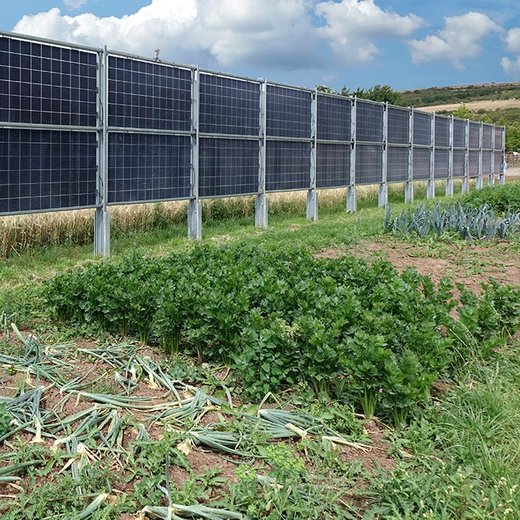
On Campus Bernburg, an agro-photovoltaic plant with an approximate output of 73.9 kWp is being constructed. This is done as part of the project: “Biodiversity in solar farms - Innovative concepts and establishment of demonstrators to improve reconciliation of photovoltaic systems, nature conservation and agriculture (BIODIV-SOLAR)“ (Duration: 09/2021-04/2025, funded by the German Federal Ministry of Education and Research (BMBF), Project Management: Prof. Sabine Tischew (Dept. 1), Prof. Ralph Gottschalg (Dept. 6). Equipped with different types of modules, the plant is used for energy yield measurements by the working group around Prof. Gottschalg. In between the vertically mounted modules, the field cultivation working group (AG Feldbau) (Prof. Dieter Orzessek) uses the space for a three-year crop rotation of winter durum wheat, millet and soybeans and investigates the influence of the modules on the yield. Wild plant strips of different species composition are sown along the modules by the working group around Professors Tischew and Kirmer to support biodiversity and provide a habitat for beneficial insects (pest antagonists). The generated electricity is fed into the university’s own grid for in-house consumption.
For more information on the project see (content DE and EN):
-
Wildflower meadows
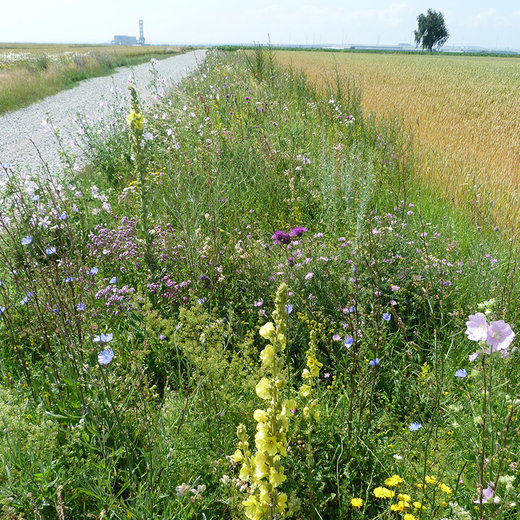
Since 2019, seven wildflower meadows with a total area of approximately 1,100 m² have been established on Campus Bernburg and four wildflower meadows with a total area of approximately 600 m² on Campus Dessau. For this purpose, frequently mowed, species-poor ornamental lawns or open areas created after construction were sown with a species-rich, area-specific wild plant mixture adapted to the respective site. Afterwards, the areas were tended extensively. In the course of redesigning the outdoor facilities on Campus Köthen, an area of approx. 150 m² is to be sown with a species-rich, native wild plant mixture in autumn 2023. This will also be tended extensively.
In addition, since 2020 local landlord TAG Wohnen & Service GmbH has been teaming up with Anhalt University of Applied Sciences to redesign the intensively mown green areas (ornamental lawns) in the Kastanienweg residential quarter, which is directly adjacent to Campus Bernburg and home to many students. After the concept of a wildflower meadow was initially tested on a small section in 2020, planning followed for the entire neighborhood. This plan is being put in place since 2021. Nine areas with a covering a total of approx. 2,400 m² have thus been sown with species-rich, native wild plant mixtures.
-
Setting up photovoltaic plants
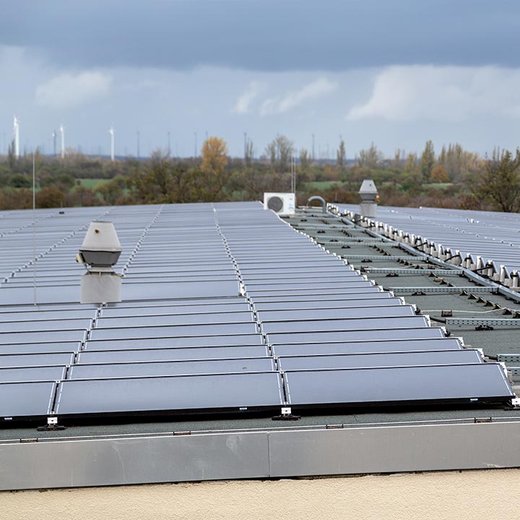
On Campus Bernburg, a large photovoltaic plant with 144.48 kWp has been in operation on the flat roof of the Klimahalle since June 2019. The plant’s maximum power output under real conditions was reached on May 28, 2022 with 124 kW. The operation of the plant has so far saved 482,996 kWh of electricity and prevented a total of 338,097 kg of CO2 emissions (as of December 13, 2022). This translates to budget savings (electricity costs) of EUR 111,000 for the entire period. All the electricity generated at the plant was used on Campus Bernburg.
As part of the BMBF project "BIODIV-SOLAR - Biodiversity in solar parks", an agro-photovoltaic plant was planned for Campus Bernburg and is currently under construction. The plant, designed to produce 73.9 kWp, is scheduled to be completed in May 2023. For research purposes, it is equipped with different module types by the working group around Prof. Gottschalg and will serve energy yield measurements. The electricity generated at the plant will be fed into the university grid for in-house consumption. Plans exist for storing the generated electricity and for its use at a charging station infrastructure.
On Campus Dessau, the renovation of the roof of the Bill Haus allowed for the installation of a photovoltaics (PV) plant with approx. 25 kWp. Also on Campus Dessau, other university buildings are being examined to see whether they meet the requirements for the construction of further PV plants.
-
Roof greening
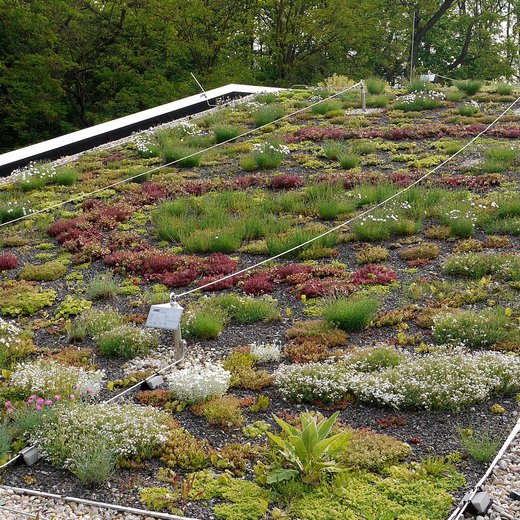
At Anhalt University of Applied Sciences, several roofs have now been extensively greened, both as part of new buildings and renovations (e.g. the Innovationswerkstatt on Campus Bernburg and Bill Haus and Gauß Haus on Campus Dessau). The total roof greening area now covers more than 1,800 m², 960 m² of which are combined with a photovoltaics plant.
Advantages of roof greening include
- a reduced load on the rainwater drainage system (delaying rainwater drainage during high loads - e.g. downpours),
- unlike concrete roofs, ‘green roofs’ do not entirely convert solar energy into thermal energy, but also into water vapor, a cooling effect on the immediate environment and prevention of a heat island effect,
- a better protection for the roof sealing system (harmful effects, such as by sunlight or rain, are reduced through the vegetation and the service life of the roof sealing is increased),
- an attenuation of ambient noise by vegetation,
- a high aesthetic value as well as the improvement of the habitat for bird life.
-
Innovationswerkstatt (innovation workshop)
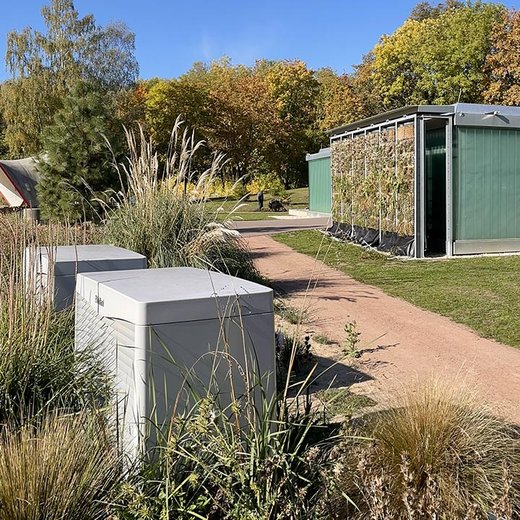
This content is being generated. Please bear with us.
-
Installation of e-car charging stations
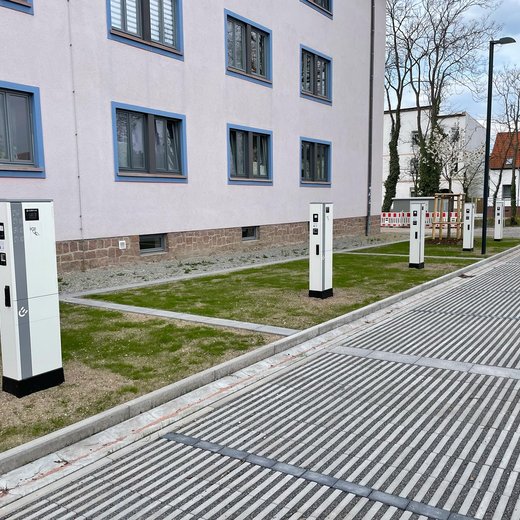
On Campus Dessau, electric cars may be charged on a charging pile equipped with two charging connections. Campus Köthen provides this service through a wall-mounted charging box. In addition, five additional charging stations, each with two charging ports, will soon go into operation on Campus Köthen. On Campus Bernburg-Strenzfeld, the installation of e-car charging stations behind Biotechnikum is currently being planned together with Stadtwerke Bernburg, the local utilities provider.
-
Teaching apiary
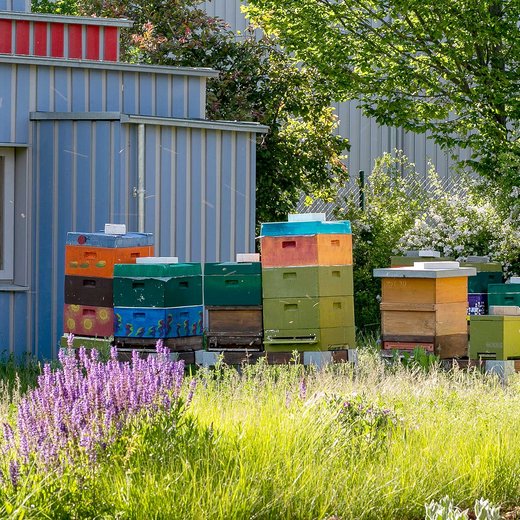
In the teaching apiary, students learn how to keep bees and how to successfully manage a colony of bees through the season. Students pursuing different degrees (especially Naturschutz und Landschaftsplanung / nature conservation and landscape planning, Landwirtschaft / agriculture, and Ökotrophologie / ecotrophology) collaborate in a practical group, thus experiencing the value of each other's expertise. During a summer semester, i.e. between April and July, each student manages their own colony of bees. This period coincides with major stages of the bee year. If the students manage to implement successful beekeeping measures, they are ‘rewarded’ by the bees with good colony development, sufficient brood, and plenty of high-quality honey. Beekeeping mistakes made by students lead to weak or sick colonies as well as overall bee loss due to swarm loss and a low honey yield. Students thus directly experience the successes or failures of their actions and are encouraged to make sure their colonies are appropriately cared for. The weekly practical courses are accompanied by a lecture, which is also open to visiting, non-degree seeking students. The honey extracted in the teaching apiary is sold as ‘campus honey’ in the dining hall on Campus Bernburg. At the honey competition of the regional Saxony-Anhalt beekeepers association, Bernburg’s ‘campus honey’ has received several first and second prizes.
Additional information (DE only)
-
Bird nesting aids / insect shelters
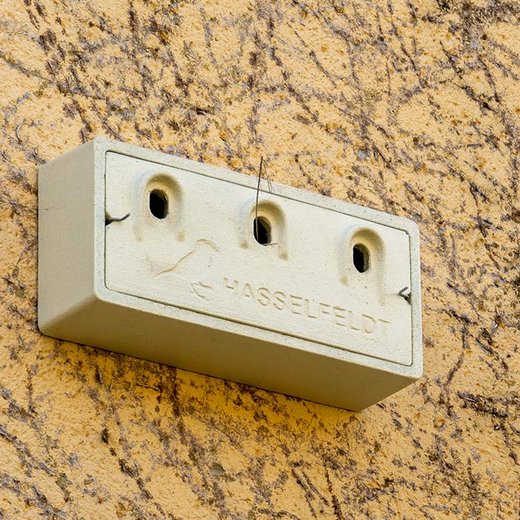
One focus of the field of action "Green Campus and Biodiversity" is to set up bird nesting aids on buildings, on woody plants and on green spaces on Anhalt University’s campuses. Members of AG Nachhaltigkeit select possible locations and see to it that the aids are actually put up. In that they receive support from student initiatives, such as the Bernburg-based Wurzelwerk, the local ornithology group (Ornithologische Arbeitsgemeinschaft Strenzfeld) and they coordinate their work with the relevant sections of Anhalt University, such as the technical administration.
On Campus Bernburg, the first bird nesting aids for house sparrows were installed on buildings in 2021 and have already been successfully accepted. With support from tree maintenance experts of the regional Saxony-Anhalt Ornithologists Association, willow baskets could be put up in treetops for long-eared owls. Also on Campus Bernburg, insect shelters with secured deadwood elements in combination with a dry wall and a wildflower meadow were part of a student project. Plans exist for the installation of bat boxes as well as nesting boxes for semi-hollow/niche nesting birds species, such as the redstart and spotted flycatcher, on Campus Bernburg Campus in spring 2023. In the roofspace of the Ratke building on Campus Köthen, a nesting box for kestrels was installed in 2021. This has been equipped with a camera, which allows following the breeding activity of the kestrel pair and the goings-on inside the nest. In 2022, two more nesting boxes for building-dwelling birds were installed in the same roof.
Additional installations of various nesting aids are being planned on all three campuses.
-
Experimental vineyard
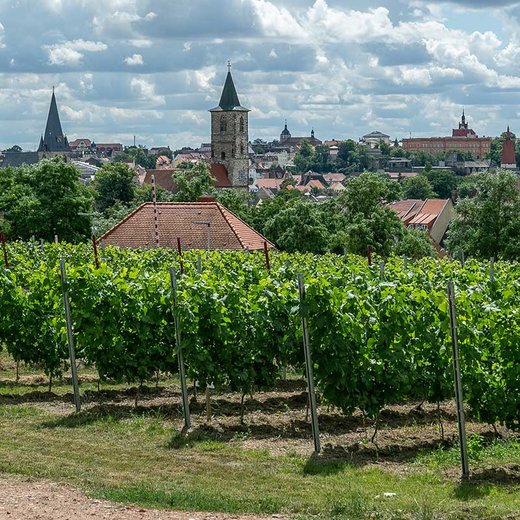
This content is being generated. Please bear with us.
Additional information